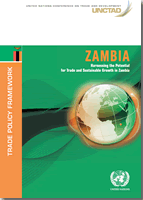At the request of the Government of Zambia, UNCTAD provided assistance in the review and reformulation of its trade policy framework. The final report has now been published.
 Words alone are not enough to thank UNCTAD for its financial and technical support. Long live this UNCTAD-Government partnership and we will engage you again in the implementation phase very soon. Words alone are not enough to thank UNCTAD for its financial and technical support. Long live this UNCTAD-Government partnership and we will engage you again in the implementation phase very soon. Ms. Lillian Bwalya Director of Commerce, Trade and Industry of Zambia UNCTAD was asked to formulate policies to:
| Download: Trade Policy Framework: Zambia - Harnessing the Potential for Trade and Sustainable Growth in Zambia |
Since independence in 1964, Zambia has depended on exports of copper for its economic development which has left it exposed to price fluctuation on the international market. . Therefore, diversifying into manufactured exports, which are more amenable to broad-based development, was considered to be of strategic importance.
UNCTAD has conducted a thorough assessment of Zambia's trade structure, patterns and existing policy frameworks and put forward a set of policy recommendations.
Recommendations include:
Zambia should work towards building a competitive economy. This will require focusing on reducing production and trade costs. Key to this is the organization of the domestic services sector and its capacity.
Most of Zambia's non-traditional trade is in the regional market. The country should seek deeper integration within the region, including active participation in the implementation of the Continental Free Trade Area (CFTA) by 2017. The COMESA-EAC-SADC Tripartite is an important step in advancing the regional integration agenda.
Zambia needs to develop production networks and supply chains within the region to take advantage of unbundling of production, diversification and value addition.
The country should explore further reduction in regional trading costs through a joint infrastructural development programme, trade facilitation activities and harmonization of rules of origin.
To address the challenges of being landlocked, Zambia should support regional integration initiatives to enhance cooperation with neighbouring countries on infrastructure development and trade facilitation, and prioritize the development of the services sector.
While perusing an open trade regime, Zambia should implement a strategic tariff policy that protects infant industries, guards against and import surge and promotes industrialization.
These policy recommendations were discussed at a national multi-stakeholder workshop in Lusaka, Zambia from 9 to 10 April 2015. During the meeting, the final trade policy document was validated and adopted by over 50 participants representing different Government ministries, the private sector and civil society organizations, including women associations. This served to reinforce country ownership, inclusiveness and national consensus.
Zambia's experience in reformulating its trade policy framework was also presented at the Trade Policy and Sustainable Development Meeting that was held in Geneva from 6-8 October 2015.
UNCTAD will continue to support Zambia in the implementation phase and encourage dissemination and sharing of insights and lessons learned with other countries.
UNCTAD's Trade Policy Framework Reviews
The Trade Policy Framework Reviews are funded under the UN Development Account Project. UNCTAD helps developing countries to assess and formulate coherent national trade policy frameworks and to strengthen the linkage between trade, employment and development. Support has been provided to Algeria, Angola, Botswana, the Dominican Republic, Jamaica, Namibia, Panama, Papua New Guinea, Rwanda, Tunisia and Zambia.




